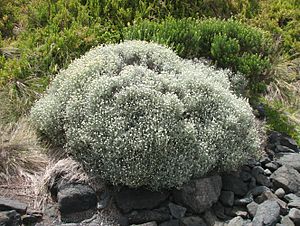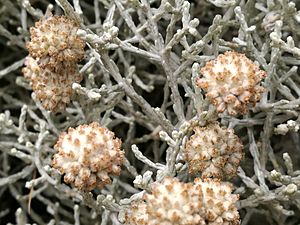Cushion bush facts for kids
Quick facts for kids Leucophyta |
|
|---|---|
 |
|
| Leucophyta brownii, Mornington Peninsula, Victoria | |
 |
|
| Leucophyta brownii, Gippsland, Victoria | |
| Scientific classification | |
| Kingdom: | |
| (unranked): | |
| (unranked): | |
| (unranked): | |
| Order: | |
| Family: | |
| Genus: |
Leucophyta
|
| Species: |
L. brownii
|
| Binomial name | |
| Leucophyta brownii Cass.
|
|
| Synonyms | |
|
Calocephalus brownii (Cass.) F.Muell. |
|
Leucophyta is a special group of plants found only in Australia. A botanist named Robert Brown first officially described this plant group in 1818.
The only type of plant in this group is called Leucophyta brownii. It is also known as the cushion bush. This name comes from its rounded, cushion-like shape.
Leucophyta brownii is a small, rounded shrub. It has many tangled branches that are covered in soft, white hairs. These hairs make the plant look silvery. It usually grows between 0.2 and 0.7 metres tall, but can sometimes reach 1 metre.
During the Australian summer (December to February), the cushion bush grows small, round flowers. These flowers are white or yellow and are about 1 cm wide.
This plant is often grown in gardens in Australia. There is even a smaller version from Tasmania called 'Silver Nugget'.
Where the Cushion Bush Lives
Leucophyta brownii loves to live near the coast. You can often find it growing on cliffs and sand dunes along the southern coast of Australia.
How it Survives Tough Conditions
This plant is very strong and can handle many difficult things. It does well in strong winds, salty sea spray, and even when there is not much rain (drought). It can also survive frost.
The cushion bush usually grows in sandy soil or soil made from sandstone. It can even grow in soil that is very alkaline, which means it has a lot of calcium carbonate (like in seashells). For the best growth, it needs lots of sunshine.
Images for kids
See also
 In Spanish: Leucophyta para niños
In Spanish: Leucophyta para niños
 | Shirley Ann Jackson |
 | Garett Morgan |
 | J. Ernest Wilkins Jr. |
 | Elijah McCoy |


